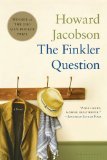Summary | Excerpt | Reviews | Beyond the Book | Readalikes | Genres & Themes | Author Bio

He should have seen it coming.
His life had been one mishap after another. So he should have been prepared for this one.
He was a man who saw things coming. Not shadowy premonitions before and after sleep, but real and present dangers in the daylit world. Lamp posts and trees reared up at him, splintering his shins. Speeding cars lost control and rode on to the footpath leaving him lying in a pile of torn tissue and mangled bones. Sharp objects dropped from scaffolding and pierced his skull.
Women worst of all. When a woman of the sort Julian Treslove found beautiful crossed his path it wasn"t his body that took the force but his mind. She shattered his calm.
True, he had no calm, but she shattered whatever calm there was to look forward to in the future. She was the future.
People who see what"s coming have faulty chronology, that is all. Treslove"s clocks were all wrong. He no sooner saw the woman than he saw the aftermath of her – his marriage proposal and her acceptance, the home they would set up together, the drawn rich silk curtains leaking purple light, the bed sheets billowing like clouds, the wisp of aromatic smoke winding from the chimney – only for every wrack of it – its lattice of crimson roof tiles, its gables and dormer windows, his happiness, his future – to come crashing down on him in the moment of her walking past.
She didn"t leave him for another man, or tell him she was sick of him and of their life together, she passed away in a perfected dream of tragic love – consumptive, wet-eyelashed, and as often as not singing her goodbyes to him in phrases borrowed from popular Italian opera.
There was no child. Children spoilt the story.
Between the rearing lamp posts and the falling masonry he would sometimes catch himself rehearsing his last words to her – also as often as not borrowed from the popular Italian operas – as though time had concertinaed, his heart had smashed, and she was dying even before he had met her.
There was something exquisite to Treslove in the presentiment of a woman he loved expiring in his arms. On occasions he died in hers, but her dying in his was better. It was how he knew he was in love: no presentiment of her expiry, no proposal.
That was the poetry of his life. In reality it had all been women accusing him of stifling their creativity and walking out on him.
In reality there had even been children.
But beyond the reality something beckoned.
On a school holiday in Barcelona he paid a gypsy fortune-teller to read his hand.
"I see a woman," she told him.
Treslove was excited. "Is she beautiful?"
"To me, no," the gypsy told him. "But to you. . . maybe. I also see danger."
Treslove was more excited still. "How will I know when I have met her?"
"You will know."
"Does she have a name?"
"As a rule, names are extra," the gypsy said, bending back his thumb. "But I will make an exception for you because you are young. I see a Juno – do you know a Juno?"
She pronounced it "Huno". But only when she remembered.
Treslove closed one eye. Juno? Did he know a Juno? Did anyone know a Juno? No, sorry, no, he didn"t. But he knew a June.
"No, no, bigger than June." She seemed annoyed with him for not being able to do bigger than June. "Judy. . . Julie. . . Judith. Do you know a Judith?"
Excerpted from The Finkler Question by Howard Jacobson Copyright 2010 by Howard Jacobson. Excerpted by permission of Bloomsbury USA.
On the whole, human beings want to be good, but not too good and not quite all the time
Click Here to find out who said this, as well as discovering other famous literary quotes!
Your guide toexceptional books
BookBrowse seeks out and recommends the best in contemporary fiction and nonfiction—books that not only engage and entertain but also deepen our understanding of ourselves and the world around us.